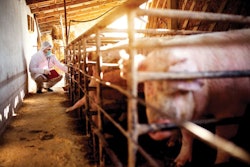
Researchers in Scotland have successfully bred pigs resistant to classical swine fever (CSF) using gene editing.
CSF is a highly contagious viral disease affecting members of the pig family. Usually fatal to swine, the disease is now endemic in many countries. Although CSF does not pose a direct threat to human health, it can destroy the livelihoods of the animals’ owners and disrupt trade.
A promising new approach to controlling CSF has been reported recently by researchers at the Roslin Institute.
The Institute is part of the University of Edinburgh’s Royal (Dick) School of Veterinary Studies in the United Kingdom (U.K.)
Working in collaboration with partners, the Roslin team successfully used gene-editing technology to confer CSF resistance to pigs.
The process did not appear to affect adversely the health or performance of the pigs.
However, not only did the gene-edited animals show no signs of infection, but they are very unlikely to spread the virus to other pigs. In contrast, the control animals showed clear symptoms of CSF, and would have transmitted the infection to others.
Preliminary studies explored how the CSF virus — and other pestiviruses — interact with cells in the pig.
A single pig protein was the focus of the research, as it was identified as playing a key role in the replication of the CSF virus in cultured cells. Further in vitro studies demonstrated that altering the gene that produces this protein could stop the virus from multiplying.
“Our research highlights the growing potential of gene editing in livestock to improve animal health and support sustainable agriculture,” said Dr. Simon Lillico of the Roslin Institute. “While previous research had identified this protein’s role in cell cultures, translating that into living animals is a major step, and one that requires the infrastructure to breed, monitor and safely test gene-edited livestock.”
These studies were conducted together with animal genetics company Genus, and colleagues at the U.K.’s Animal and Plant Health Agency, and the University of Lubeck in Germany.
Potential global impact of research breakthrough
While it is not found in the U.K., the CSF virus is linked to outbreaks in some Asian, African and Latin American countries, according to the Roslin Institute.
Vaccines are available for CSF, but the resilience of the virus and transmission between swine species make complete control of the disease challenging.
Viruses of the same family — pestiviruses — cause disease in other livestock, such as bovine viral diarrhea in cattle, and border disease in sheep.
A similar gene-editing technique to that used for CSF could be effective for the control of other diseases, according to the Roslin researchers.
Recent CSF developments in Asia
Last week, a wild boar found dead in Krishima city in Japan tested positive for CSF virus, according to the agriculture ministry.
Since CSF re-emerged in the country in 2018, cases have been reported widely in the nation’s wild boar population. Outbreaks have also been confirmed in a total of 100 pig farms, based on notifications to of the World Organisation for Animal Health (WOAH).
However, the latest wild boar case is significant as it is the first in Kagoshima, a prefecture on Japan’s most southwestern island of Kyushu.
Oral CSF vaccination was already carried out in the area — as it is widely across the country to prevent infections in the wild population — but the ministry has stepped up these applications. Furthermore, more of the animals in Kagoshima are being captured and tested for the virus.
Farmers in the area are being urged by the ministry to ensure that all domestic pigs are fully vaccinated against CSF, as well as to follow updated advice on biosecurity and the need to report any suspicious signs of disease in their animals.
This month, South Korea’s agriculture ministry announced plans to eradicate CSF by 2030, reported Yonhap news agency.
According to the new roadmap, the ministry will introduce a new CSF vaccine to replace that currently used. This novel version contains a marker that allows authorities to distinguish between vaccinated animals from those infected with the disease. Furthermore, more domestic pigs will be tested for the virus — at least 25,000 per year.
If these efforts are successful in the next couple of years, the ministry will apply to WOAH for CSF-free status in 2030.
In a recent report covering the first six months of 2025, the veterinary authority of Indonesia has reported to WOAH three outbreaks of CSF in domestic pigs. Six cases of the disease were recorded.
















